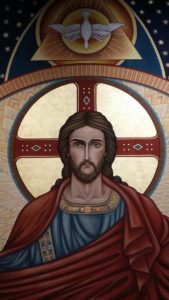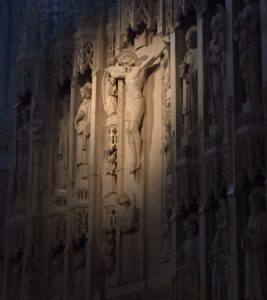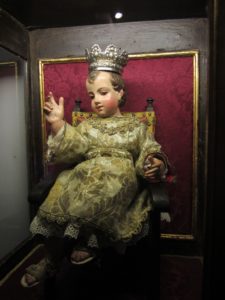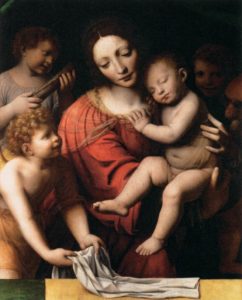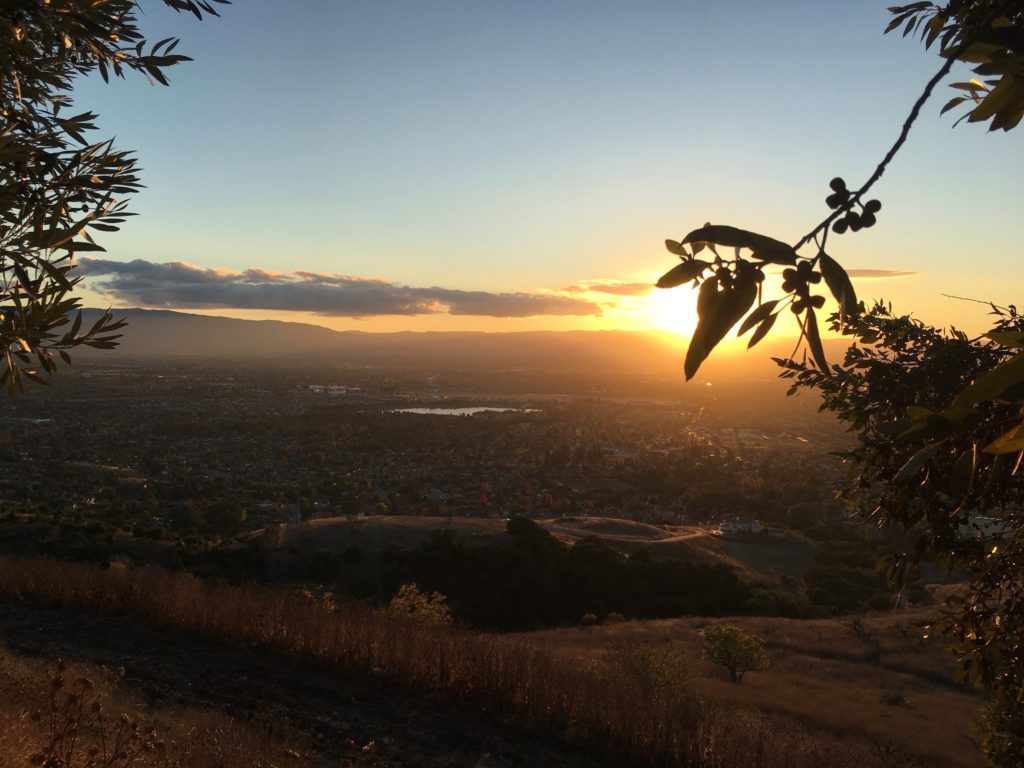The Litany of Humility
O Jesus! meek and humble of heart, Hear me.
From the desire of being esteemed, Deliver me, Jesus.
From the desire of being loved…
From the desire of being extolled …
From the desire of being honored …
From the desire of being praised …
From the desire of being preferred to others…
From the desire of being consulted …
From the desire of being approved …
From the fear of being humiliated …
From the fear of being despised…
From the fear of suffering rebukes …
From the fear of being calumniated …
From the fear of being forgotten …
From the fear of being ridiculed …
From the fear of being wronged …
From the fear of being suspected …
That others may be loved more than I, Jesus, grant me the grace to desire it.
That others may be esteemed more than I …
That, in the opinion of the world,
others may increase and I may decrease …
That others may be chosen and I set aside …
That others may be praised and I unnoticed …
That others may be preferred to me in everything…
That others may become holier than I, provided that I may become as holy as I should…
The Litany of Humility is a great introduction to the ‘nada’ the negation of St. John of the Cross. Why? Because his ascetism is all about desire. It’s not about things and it’s not about people. It’s about what’s inside, and the space that we need to make inside for the savior to reside and thrive. The biggest obstacle to this mystical space, the biggest obstacle to this presence of God, the gift of His presence and His grace is nothing less, and rooted in pride – the false pride of an ego-centered existence.
This Litany goes totally against the grain of our human, automatic, natural need. By nature, especially if we’re looking at the human person simply from an emotional and psychological perspective, we need at times, to feel esteemed. We need to be loved. We need to somehow, some way, feel honored; hence, the birthday parties.
We need, at times, to want to be approved and validated. By nature, we cringe and are afraid of being humiliated. We don’t want to be despised. We don’t like to suffer rebukes. Nobody wants to be calumniated, or feel forgotten. Nobody enjoys being ridiculed, wronged, or suspected. In the prayer, we ask God to give us the grace of not allowing our happiness to be dependent on things, and our well-being to be attached and dependent upon other people.
When my sense of self-worth is dependent on other people, and how they respond to me, and if that’s the center, then my life will always be disordered. There will always be something missing, or upsetting me, or disturbing me, or making me afraid – if my life is dependent and entirely intertwined with how other people respond to my personality. This is a recipe for disappointment.
These fears of humiliation, being despised, and of suffering rebukes are normal, but we ask in the Litany, ‘from the fear of this, deliver me!’ Ultimately, what causes this anxiety is pride. The pride that is rooted in egoism is annihilated when I embrace my nothingness, and my total dependence on God.
‘I am not God, I am not in total control, in full charge of all the ramifications that affect my life. I can’t dictate the consequences and outcomes of how everything is going to be. I’m entirely dependent on someone greater than me. I am not sovereign in and of myself.’ That’s embracing my nothingness. I am a human being. I am not God.
Therefore, when I embrace that nothingness, I embrace my own imperfection. I embrace the fact that I am not perfect, nor can I be perfect based on myself and on my own effort. If I am going to be refined and purified by correction, by my faults being brought to my attention – then that is the truth of who I am! That is the truth of my nothingness, and I have to embrace that truth in order to be set free.
If I try to embrace a fundamental falsehood that ‘I don’t need correction, or I don’t need improvement, or I don’t need anybody to tell me what to do and how to become better,’ then I’m going to be subject to these fears. And I’m still going to be enslaved to myself, a slave to myself!
Saint John of the Cross is trying to set us free from that slavery, from that Egypt. He calls us to an exodus, to escape from our self-centered existence.
In the last part of the prayer, we ask, ‘That others may be loved more than I.’ This gets to the core, the heart of how we normally, naturally, automatically think, feel, and desire – based on nature.
According to a secular, psychological perspective of the human being, this request seems like a total contradiction; it’s a total contradiction to healthy, human development, but it’s the wisdom and the power of the cross. This is the remedy to truly make us fully human.
‘That others may be loved more than I’ – prepares the way, on a human level, a certain altruism, desiring the good of someone else more than your own good. What a breakthrough that is! What a liberation that is! – to be more concerned with someone else’s good than my own?
‘That others may be esteemed more than I’ – to rejoice when somebody else is praised and I am totally left unnoticed? The moment of liberty is to truly be able to rejoice from the inside out. When you are truly happy from the core of your being for someone else’s accomplishment without a tinge of jealousy, but celebrating their victory as if it were your own – that’s humility. It’s a beautiful thing. That’s truly living as one, as a community.
‘That in the opinion of the world, others may increase and I may decrease.’ In other words, according to the spirit of the world, I have no desire to be popular. If I am no longer esteemed as being ‘with it,’ if I am no longer considered to be hip or whatever might make the personality of an individual attractive to the spirit of the world, then maybe, I’m doing something right – in regards to what is attractive to Christ and with respect to my lifestyle.
‘That in the opinion of the world, others may increase and I may decrease.’ That is an echo of Saint John the Baptist, a restructuring of John 3:30, ‘That He (Jesus Christ) may increase, and I may decrease.’ One of my favorite lines from Saint Athanasius is ‘If the world goes against the truth, Athanasius goes against the world.’
‘That others may be chosen, and I, set aside.’ – that others may be preferred to me in everything!
Ultimately, the crown of them all, ‘That others may become holier than I, provided that I become as holy as God is calling me to be, provided that I BE-come who I am created to BE.’
That’s true humility because humility always breeds confidence. Embracing my nothingness should always lead to a greater embrace of God’s greatness. The two are interconnected. I’m not dust, left to myself; I’m dust, redeemed by the cross, and therefore, united to God’s greatness.
This is a good introduction to the nada, the right kind of emptiness of Saint John of the Cross. We need to understand the right kind of emptiness and self-denial, as it is called in traditional spirituality.
Copyright 2017 Father Robert Barcelos, OCD. All rights reserved
